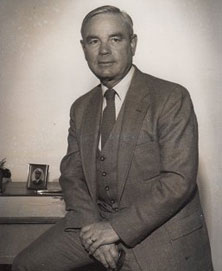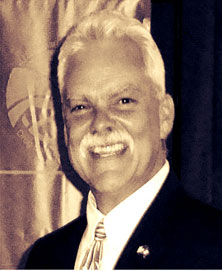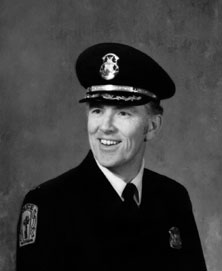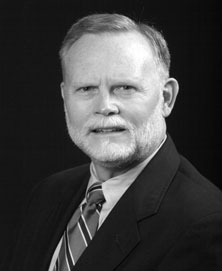2013 Honorees
Richard Bernitt
 Richard Bernitt graduated from Police Administration at Michigan State University with a Bachelors of Science in 1943 and a Masters of Science in 1962. A dual sports star at Monroe High School in football and baseball, Richard went on to play baseball as a pitcher at Michigan State where he was a teammate of Jack Breslin. Following graduation he was commissioned as a Second Lieutenant in the U. S. Army and served until 1946.
Richard Bernitt graduated from Police Administration at Michigan State University with a Bachelors of Science in 1943 and a Masters of Science in 1962. A dual sports star at Monroe High School in football and baseball, Richard went on to play baseball as a pitcher at Michigan State where he was a teammate of Jack Breslin. Following graduation he was commissioned as a Second Lieutenant in the U. S. Army and served until 1946.
Richard joined the staff of Michigan State University as a fire inspector and later rose to become the Director of Public Safety until his retirement in 1986. Following retirement, he then began a second career as a professional volunteer devoting himself primarily to helping the R.J. Scheffel Memorial Toy Project that annually gives toys during December to needy children and families.
Richard Bernitt was awarded the Jack Breslin Distinguished Staff Award in recognition not only of his professional contributions to Michigan State University, but additionally for his community service as well.
![]()
Robert Corso
 Robert Corso graduated from the School of Criminal Justice at Michigan State University with a Bachelor of Science degree in 1976. Robert Corso serves as the Special Agent in Charge of the U.S. Department of Justice, Drug Enforcement Administration, Detroit Field Division. As a Special Agent in Charge, Robert is responsible for all federal drug enforcement operations, drug diversion and regulatory investigations, intelligence operations and administrative functions for the states of Michigan, Ohio and Kentucky. He has over 30 years of law enforcement experience, having served as a police officer with the Pontiac, Michigan Police Department where he served as a uniformed patrolman and the Grand Rapids Police Department where he served as a patrol officer/paramedic, swat officer, and as a member of an undercover team that focused on high crime prior to his federal service.
Robert Corso graduated from the School of Criminal Justice at Michigan State University with a Bachelor of Science degree in 1976. Robert Corso serves as the Special Agent in Charge of the U.S. Department of Justice, Drug Enforcement Administration, Detroit Field Division. As a Special Agent in Charge, Robert is responsible for all federal drug enforcement operations, drug diversion and regulatory investigations, intelligence operations and administrative functions for the states of Michigan, Ohio and Kentucky. He has over 30 years of law enforcement experience, having served as a police officer with the Pontiac, Michigan Police Department where he served as a uniformed patrolman and the Grand Rapids Police Department where he served as a patrol officer/paramedic, swat officer, and as a member of an undercover team that focused on high crime prior to his federal service.
Robert is a member of the International Chiefs of Police, the Michigan Association of Chiefs of Police and a Lifetime member of the California Narcotic Officers Association.
![]()
John Donovan
 John Donovan graduated from Police Administration at Michigan State University with a Bachelor of Science degree in 1959. John has dedicated his career to law enforcement serving as a Public Safety Officer and Civil Defense Coordinator for the Oak Park Department of Public Safety (Michigan), as Chief for the City of Troy Police Department (Michigan) and as an Assistant Professor in Law Enforcement at Oakland Community College (Michigan). He served as Chief of Police for the City of Troy with integrity and honesty while working with the community and the officers under his command.
John Donovan graduated from Police Administration at Michigan State University with a Bachelor of Science degree in 1959. John has dedicated his career to law enforcement serving as a Public Safety Officer and Civil Defense Coordinator for the Oak Park Department of Public Safety (Michigan), as Chief for the City of Troy Police Department (Michigan) and as an Assistant Professor in Law Enforcement at Oakland Community College (Michigan). He served as Chief of Police for the City of Troy with integrity and honesty while working with the community and the officers under his command.
John Donovan is a member of the School of Criminal Justice Alumni Association Board of Directors, Michigan State University Alumni Association, past-president of the Troy Police Officers Association, Troy Police Command Officers Association, Oakland County Chiefs of Police Association, Michigan Association of Chiefs of Police and International Association of Chiefs of Police.
![]()
Daniel Heyns
 Daniel Heyns graduated from the School of Criminal Justice at Michigan State University with a Masters of Science in 1977 and is a graduate of the FBI National Academy in Quantico, Virginia. He is the Director of the Michigan Department of Corrections. As Director, Daniel is responsible for the administration of Michigan’s correctional system that includes the adult prison system, probation and parole board, parole supervision and community corrections. He oversees 31 prison facilities, over 43,000 prisoners, 18,000 parolees, and 49,000 probationers. Daniel has over 34 years experience in law enforcement serving as the Sheriff and Undersheriff, jail administrator and probation officer in Jackson County, Michigan.
Daniel Heyns graduated from the School of Criminal Justice at Michigan State University with a Masters of Science in 1977 and is a graduate of the FBI National Academy in Quantico, Virginia. He is the Director of the Michigan Department of Corrections. As Director, Daniel is responsible for the administration of Michigan’s correctional system that includes the adult prison system, probation and parole board, parole supervision and community corrections. He oversees 31 prison facilities, over 43,000 prisoners, 18,000 parolees, and 49,000 probationers. Daniel has over 34 years experience in law enforcement serving as the Sheriff and Undersheriff, jail administrator and probation officer in Jackson County, Michigan.
Daniel Heyns has served on the Michigan Sheriffs’ Association, Big Brothers/Big Sisters, Y Center, Rotary Foundation and Disability Connections boards. He is also a member of the Governor’s Cabinet (Michigan) and Public Safety Executive Workgroup.
![]()
Beth Huebner
 Beth Huebner received her PhD from the School of Criminal Justice at Michigan State University in 2003. Dr. Huebner is an Associate Professor and Director of the Graduate program in the Department of Criminology and Criminal Justice at the University of Missouri-St. Louis. She is nationally known for her work in the field of corrections and has most recently been elected to serve as President of the Association of Doctoral Programs in Criminology and Criminal Justice. Dr. Huebner’s current research interests include prisoner reentry, criminal justice decision-making, and quantitative research methods.
Beth Huebner received her PhD from the School of Criminal Justice at Michigan State University in 2003. Dr. Huebner is an Associate Professor and Director of the Graduate program in the Department of Criminology and Criminal Justice at the University of Missouri-St. Louis. She is nationally known for her work in the field of corrections and has most recently been elected to serve as President of the Association of Doctoral Programs in Criminology and Criminal Justice. Dr. Huebner’s current research interests include prisoner reentry, criminal justice decision-making, and quantitative research methods.
Dr. Huebner is the recipient of the Distinguished New Scholar Award from the American Society of Criminology Division on Corrections and Sentencing, Academy of Criminal Justice Sciences, Juvenile Justice Section, Tori Caeti Award, Academy of Criminal Justice Sciences Donal MacNamara Award and the University of Missouri-St. Louis Meritorious Service Award – Office of Disability Access Services and the Gerald and Deanne Gitner Excellence in Teaching Award.
![]()
Patricia Nowak
 Patricia Nowak graduated from the School of Criminal Justice at Michigan State University with a Bachelor of Science in 1980 and a Masters of Science in 2000. She began her career as a police officer for the City of East Lansing, Michigan rising through the ranks to become a Detective, Sergeant and Supervisor. Patricia left the City of East Lansing Police department in 2012 to become the Police Chief of Indiana University where she commands a department of eighteen officers, a dispatch center and is the acting Assistant Emergency Operations Manager for the University. Additionally, Pat is a facilitator and instructor for the Executive Law Enforcement Staff and Command school at Michigan State University.
Patricia Nowak graduated from the School of Criminal Justice at Michigan State University with a Bachelor of Science in 1980 and a Masters of Science in 2000. She began her career as a police officer for the City of East Lansing, Michigan rising through the ranks to become a Detective, Sergeant and Supervisor. Patricia left the City of East Lansing Police department in 2012 to become the Police Chief of Indiana University where she commands a department of eighteen officers, a dispatch center and is the acting Assistant Emergency Operations Manager for the University. Additionally, Pat is a facilitator and instructor for the Executive Law Enforcement Staff and Command school at Michigan State University.
Patricia Nowak is the recipient of the East Lansing Police Officer of the Year Award, Police Officer of the Year, Towne Courier Award and has been inducted into the Professional Women of America.
![]()
Darrell Ross
 Darrell Ross received his PhD from the School of Criminal Justice at Michigan State University in 1992. He is the Department Head of Sociology, Anthropology and Criminal Justice at Valdosta State University, Valdosta, GA. Prior to serving as a Department Head at Valdosta State University, Dr. Ross served as the Chair for the Department of Law Enforcement & Justice Administration at Western Illinois University, taught criminal justice courses and was the Director of Forensic Sciences at East Carolina University. Dr. Ross also conducted research and provided training for police and correctional agencies at the Criminal Justice Institute at Ferris State University. He has published over 80 articles, 4 books, and 4 book chapters that include Civil Liability in Criminal Justice and Sudden Deaths In-Custody with Dr. Ted Chan.
Darrell Ross received his PhD from the School of Criminal Justice at Michigan State University in 1992. He is the Department Head of Sociology, Anthropology and Criminal Justice at Valdosta State University, Valdosta, GA. Prior to serving as a Department Head at Valdosta State University, Dr. Ross served as the Chair for the Department of Law Enforcement & Justice Administration at Western Illinois University, taught criminal justice courses and was the Director of Forensic Sciences at East Carolina University. Dr. Ross also conducted research and provided training for police and correctional agencies at the Criminal Justice Institute at Ferris State University. He has published over 80 articles, 4 books, and 4 book chapters that include Civil Liability in Criminal Justice and Sudden Deaths In-Custody with Dr. Ted Chan.
Dr. Ross has been awarded the Scholar of the Year by the Department of Criminal Justice at Eastern Carolina University, the Distinguished Scholar/Professor Award by the Chancellor at Eastern Carolina University and Outstanding Teaching/Research Award by the North Carolina Criminal Justice Educators Association.
![]()
Distinguished Faculty Inductee
Timothy Bynum
 Timothy Bynum joined the faculty of the School of Criminal Justice at Michigan State University in 1977 after earning his PhD in Criminology from Florida State University. He is a professor teaching at the graduate and undergraduate level, supervising doctoral dissertations and Masters theses research projects, and administrating the Ph.D. program. Dr. Bynum is also the Director of the National Archive of Criminal Justice Data (NACJD) at the Inter-university Consortium on Political and Social Research, at the University of Michigan. His current research includes the study of community-based interventions to reduce gang and gun violence, the implementation and assessment of an innovative neighborhood approach to violence in nine communities, and an assessment of the impact of residency restrictions for sex offenders.
Timothy Bynum joined the faculty of the School of Criminal Justice at Michigan State University in 1977 after earning his PhD in Criminology from Florida State University. He is a professor teaching at the graduate and undergraduate level, supervising doctoral dissertations and Masters theses research projects, and administrating the Ph.D. program. Dr. Bynum is also the Director of the National Archive of Criminal Justice Data (NACJD) at the Inter-university Consortium on Political and Social Research, at the University of Michigan. His current research includes the study of community-based interventions to reduce gang and gun violence, the implementation and assessment of an innovative neighborhood approach to violence in nine communities, and an assessment of the impact of residency restrictions for sex offenders.
Dr. Bynum is the Associate Editor of Justice Quarterly, advisory board member of the Correctional Options Demonstration Program, Bureau of Justice Assistance, member of the Academy of Criminal Justice Sciences and the American Society of Criminology.

